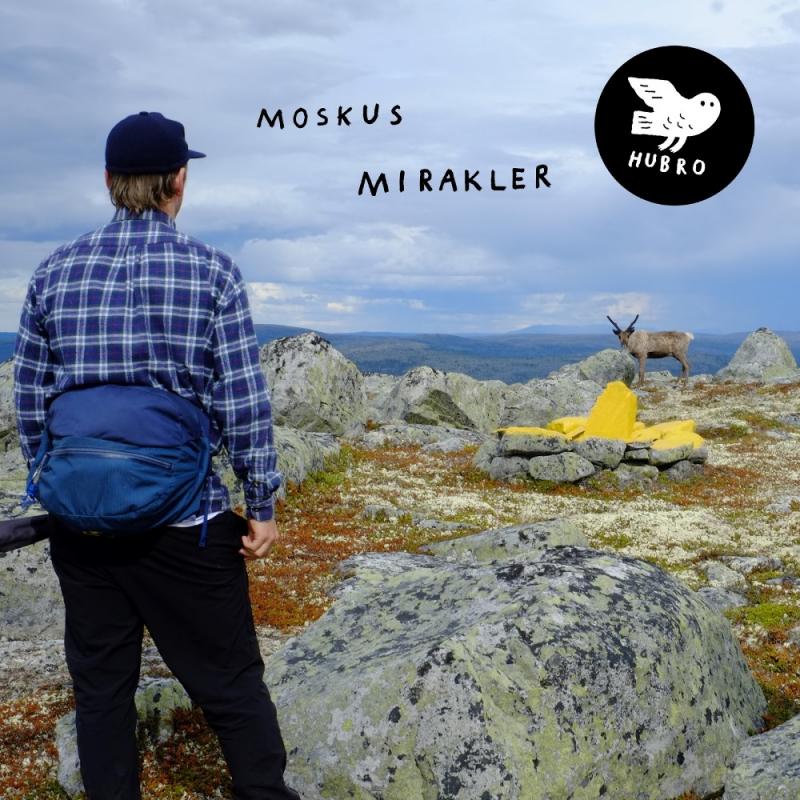CD: Moskus - Mirakler | reviews, news & interviews
CD: Moskus - Mirakler
CD: Moskus - Mirakler
Fourth album from a Norwegian trio with little regard for genre constraints

Last month, theartsdesk reviewed Skadedyr’s Musikk!, an eccentric album which skipped “through jazz, traditional music, atonal scrapings and wind instrument burblings.” Twelve Norwegian musicians were heard.
Double bass (played by Dietrichson), drums (Hulbækmo) and piano (Lauvdal) are Moskus’ core instruments. Hammond organ, a musical saw, various synthesisers and vibes also crop up. Of the album’s 13 tracks, 10 began as improvisations which were subsequently arranged and three draw from themes composed by Hulbækmo. “Haiku” lasts 13 seconds. “Sang Til C” runs for five minutes, seven seconds. From this information alone, Mirakler would seem to be as oblivious to genre constraints as Musikk!
And so it proves. The winningly titled “Jailhouse Art Music” is underpinned by brushed drums and clattering, pattering percussion but is defined by Hammond playing in which clusters of two or three notes suggest a deconstruction of classic Jimmy Smith. It’s followed by “(“,)”, where an ethereal bowed saw weaves in and out of a pastoral, wandering piano line. Over one minute, 22 seconds, “Spurte Hva Det Var” sets squeaking noises off against the rhythm machine and keyboard of a Casio MT-65. It could been issued by the Rough Trade label in 1982.
Attempting to set Moskus into a contemporary context other than that of similarly minded Norwegian contemporaries like 1982, Erlend Apneseth Trio, Splashgirl or Slagr is futile. All are integral to a musical landscape which pays no heed to the formulaic. Mirakler is a jazz album, but only nominally so. However, the only analogous framework is the progg movement (sic: not prog rock) which emerged in Sweden in the late 1960s and early 1970s – though that was about finding a Swedish-ness and fusing it with rock music as the vehicle to realise this vision. Moskus may not be dealing in a congruent search for Norwegian-ness, but it’s clear that whatever is happening in Norway is correspondingly distinctive.
rating
Explore topics
Share this article
The future of Arts Journalism
You can stop theartsdesk.com closing!
We urgently need financing to survive. Our fundraising drive has thus far raised £49,000 but we need to reach £100,000 or we will be forced to close. Please contribute here: https://gofund.me/c3f6033d
And if you can forward this information to anyone who might assist, we’d be grateful.

Subscribe to theartsdesk.com
Thank you for continuing to read our work on theartsdesk.com. For unlimited access to every article in its entirety, including our archive of more than 15,000 pieces, we're asking for £5 per month or £40 per year. We feel it's a very good deal, and hope you do too.
To take a subscription now simply click here.
And if you're looking for that extra gift for a friend or family member, why not treat them to a theartsdesk.com gift subscription?
more New music
 Trio Da Kali, Milton Court review - Mali masters make the ancient new
Three supreme musicians from Bamako in transcendent mood
Trio Da Kali, Milton Court review - Mali masters make the ancient new
Three supreme musicians from Bamako in transcendent mood
 Hollie Cook's 'Shy Girl' isn't heavyweight but has a summery reggae lilt
Tropical-tinted downtempo pop that's likeable if uneventful
Hollie Cook's 'Shy Girl' isn't heavyweight but has a summery reggae lilt
Tropical-tinted downtempo pop that's likeable if uneventful
 Pop Will Eat Itself's 'Delete Everything' is noisy but patchy
Despite unlovely production, the Eighties/Nineties unit retain rowdy ebullience
Pop Will Eat Itself's 'Delete Everything' is noisy but patchy
Despite unlovely production, the Eighties/Nineties unit retain rowdy ebullience
 Music Reissues Weekly: The Earlies - These Were The Earlies
Lancashire and Texas unite to fashion a 2004 landmark of modern psychedelia
Music Reissues Weekly: The Earlies - These Were The Earlies
Lancashire and Texas unite to fashion a 2004 landmark of modern psychedelia
 Odd times and clunking lines in 'The Life of a Showgirl' for Taylor Swift
A record this weird should be more interesting, surely
Odd times and clunking lines in 'The Life of a Showgirl' for Taylor Swift
A record this weird should be more interesting, surely
 Waylon Jennings' 'Songbird' raises this country great from the grave
The first of a trove of posthumous recordings from the 1970s and early 1980s
Waylon Jennings' 'Songbird' raises this country great from the grave
The first of a trove of posthumous recordings from the 1970s and early 1980s
 Lady Gaga, The Mayhem Ball, O2 review - epic, eye-boggling and full of spirit
One of the year's most anticipated tours lives up to the hype
Lady Gaga, The Mayhem Ball, O2 review - epic, eye-boggling and full of spirit
One of the year's most anticipated tours lives up to the hype
 Slovenian avant-folk outfit Širom’s 'In the Wind of Night, Hard-Fallen Incantations Whisper' opens the door to inner space
Unconventional folk-based music which sounds like nothing else
Slovenian avant-folk outfit Širom’s 'In the Wind of Night, Hard-Fallen Incantations Whisper' opens the door to inner space
Unconventional folk-based music which sounds like nothing else
 'The Art of Loving': Olivia Dean's vulnerable and intimate second album
Neo soul Londoner's new release outgrows her debut
'The Art of Loving': Olivia Dean's vulnerable and intimate second album
Neo soul Londoner's new release outgrows her debut
 Music Reissues Weekly: The Peanut Butter Conspiracy - The Most Up Till Now
Definitive box-set celebration of the Sixties California hippie-pop band
Music Reissues Weekly: The Peanut Butter Conspiracy - The Most Up Till Now
Definitive box-set celebration of the Sixties California hippie-pop band
 Doja Cat's 'Vie' starts well but soon tails off
While it contains a few goodies, much of the US star's latest album lacks oomph
Doja Cat's 'Vie' starts well but soon tails off
While it contains a few goodies, much of the US star's latest album lacks oomph

Add comment